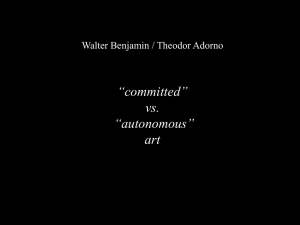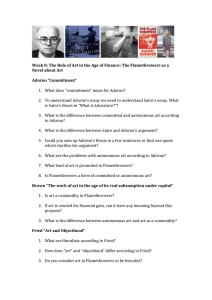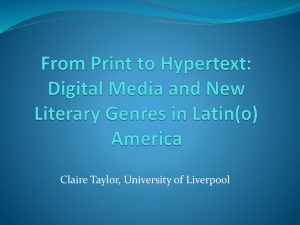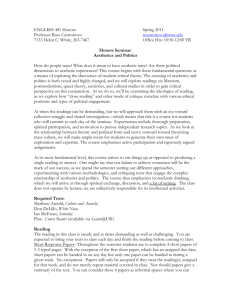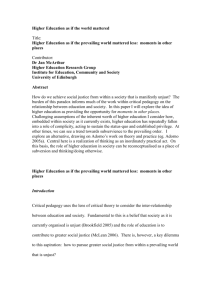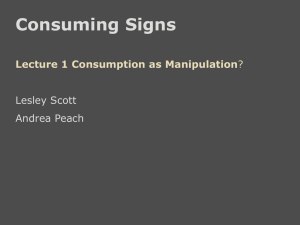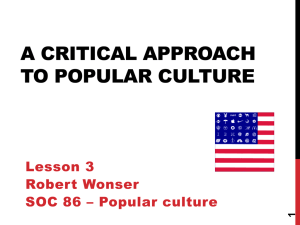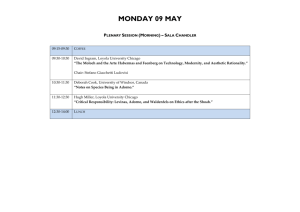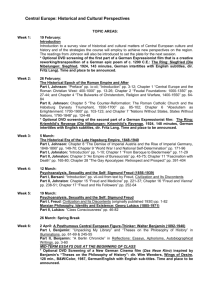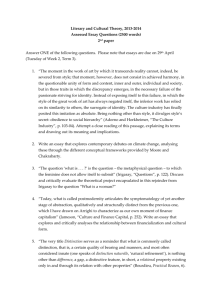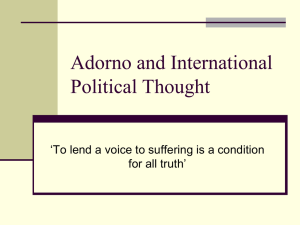Literary and Cultural Theory, 2004-2005
advertisement
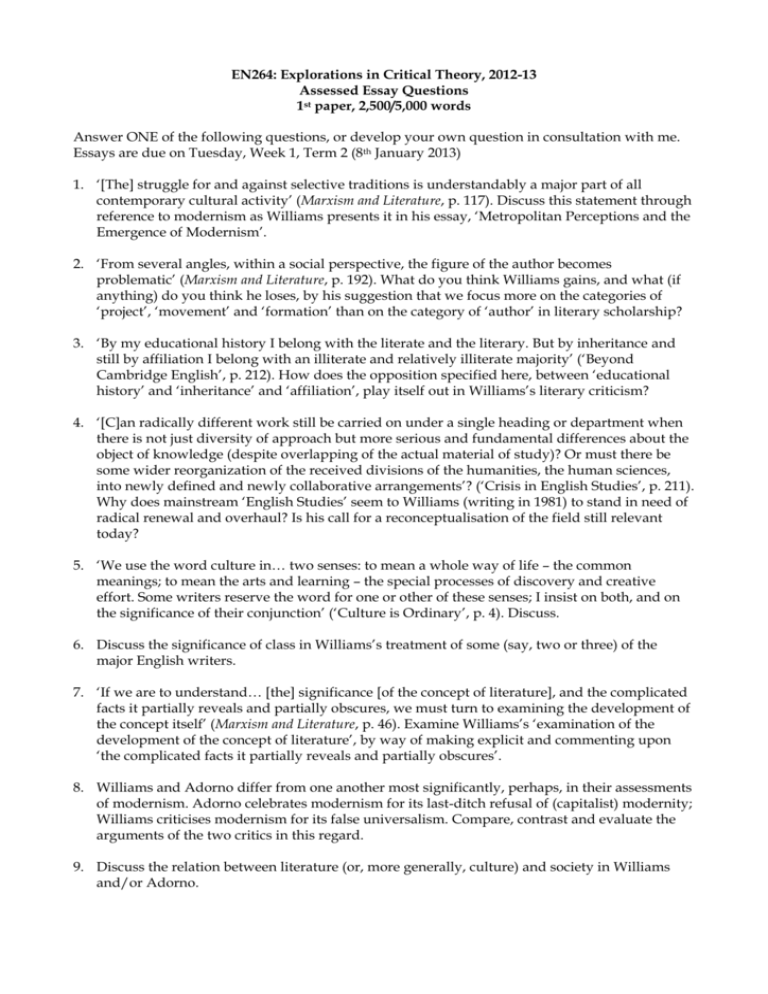
EN264: Explorations in Critical Theory, 2012-13 Assessed Essay Questions 1st paper, 2,500/5,000 words Answer ONE of the following questions, or develop your own question in consultation with me. Essays are due on Tuesday, Week 1, Term 2 (8th January 2013) 1. ‘[The] struggle for and against selective traditions is understandably a major part of all contemporary cultural activity’ (Marxism and Literature, p. 117). Discuss this statement through reference to modernism as Williams presents it in his essay, ‘Metropolitan Perceptions and the Emergence of Modernism’. 2. ‘From several angles, within a social perspective, the figure of the author becomes problematic’ (Marxism and Literature, p. 192). What do you think Williams gains, and what (if anything) do you think he loses, by his suggestion that we focus more on the categories of ‘project’, ‘movement’ and ‘formation’ than on the category of ‘author’ in literary scholarship? 3. ‘By my educational history I belong with the literate and the literary. But by inheritance and still by affiliation I belong with an illiterate and relatively illiterate majority’ (‘Beyond Cambridge English’, p. 212). How does the opposition specified here, between ‘educational history’ and ‘inheritance’ and ‘affiliation’, play itself out in Williams’s literary criticism? 4. ‘[C]an radically different work still be carried on under a single heading or department when there is not just diversity of approach but more serious and fundamental differences about the object of knowledge (despite overlapping of the actual material of study)? Or must there be some wider reorganization of the received divisions of the humanities, the human sciences, into newly defined and newly collaborative arrangements’? (‘Crisis in English Studies’, p. 211). Why does mainstream ‘English Studies’ seem to Williams (writing in 1981) to stand in need of radical renewal and overhaul? Is his call for a reconceptualisation of the field still relevant today? 5. ‘We use the word culture in… two senses: to mean a whole way of life – the common meanings; to mean the arts and learning – the special processes of discovery and creative effort. Some writers reserve the word for one or other of these senses; I insist on both, and on the significance of their conjunction’ (‘Culture is Ordinary’, p. 4). Discuss. 6. Discuss the significance of class in Williams’s treatment of some (say, two or three) of the major English writers. 7. ‘If we are to understand… [the] significance [of the concept of literature], and the complicated facts it partially reveals and partially obscures, we must turn to examining the development of the concept itself’ (Marxism and Literature, p. 46). Examine Williams’s ‘examination of the development of the concept of literature’, by way of making explicit and commenting upon ‘the complicated facts it partially reveals and partially obscures’. 8. Williams and Adorno differ from one another most significantly, perhaps, in their assessments of modernism. Adorno celebrates modernism for its last-ditch refusal of (capitalist) modernity; Williams criticises modernism for its false universalism. Compare, contrast and evaluate the arguments of the two critics in this regard. 9. Discuss the relation between literature (or, more generally, culture) and society in Williams and/or Adorno. 10. ‘After the Second World War, everything, including a resurrected culture, has been destroyed without realizing it; humankind continues to vegetate, creeping along after events that even the survivors cannot survive, on a rubbish heap that has made even reflection on one’s own damaged state useless’ (‘Trying to Understand Endgame’, p. 244). Adorno speaks, here, of a post-catastrophe situation so bleak that, in it, ‘even the survivors cannot survive’. On his reading, Beckett’s play dramatises this ground-zero situation. But surely Adorno values Beckett’s work precisely because it might in these terms be said to refuse the very situation that it names? (Isn’t this refusing just what Adorno says that culture – and criticism – does in general?) Discuss the apparent – or actual – paradox here. 11. ‘We are also familiar with the readiness today to deny or minimize what happened – no matter how difficult it is to comprehend that people feel no shame in arguing that it was at most only five and not six million Jews who were gassed. Furthermore, the quite common move of drawing up a balance sheet of guilt is irrational, as though Dresden compensated for Auschwitz. Drawing up such calculations, the haste to produce counter-arguments in order to exempt oneself from self-reflection, already contain something inhuman, and military actions in the war, the examples of which, moreover, are called “Coventry” and “Rotterdam,” are scarcely comparable to the administrative murder of millions of innocent people. Even their innocence, which cannot be more simple and plausible, is contested. The enormity of what was perpetrated works to justify this: a lax consciousness consoles itself with the thought that such a thing surely could not have happened unless the victims had in some way or another furnished some kind of instigation, and this “some kind of” may then be multiplied at will. The blindness disregards the flagrant disproportion between an extremely fictitious guilt and an extremely real punishment. At times the victors themselves are made responsible for what the vanquished did when they themselves were still beyond reach, and responsibility for the atrocities of Hitler is shifted onto those who tolerated his seizure of power and not to the ones who cheered him on. The idiocy of all this is truly a sign of something that psychologically has not been mastered, a wound, although the idea of wounds would be rather more appropriate for the victims’ (‘The Meaning of Working through the Past’, pp. 90-91). Attempt a close reading of this passage, explaining and elucidating it, and exploring what if any implications it holds for us in today’s political culture. 12. ‘The individual himself is revealed to be a historical category, both the outcome of the capitalist process of alienation and a defiant protest against it, something transient himself’ (‘Trying to Understand Endgame’, p. 249). Discuss this proposition, either in the context of an analysis of Adorno’s reading of Beckett’s play or more generally, as an historico-philosophical statement. 13. ‘The essay is both more open and more closed than traditional thought would like’ (‘The Essay as Form’, p. 17). Write an essay on the form of the essay, as Adorno conceives it. 14. ‘This is not the time for political works of art; rather, politics has migrated into the autonomous work of art, and it has penetrated most deeply into works that present themselves as politically dead…’ (‘Commitment’, pp. 93-94). Do you agree with Adorno on the subject of ‘commitment’ in art? Why/why not? 15. ‘The feminine character, and the ideal of femininity on which it is modelled, are products of masculine society… Glorification of the feminine character implies the humiliation of all who bear it’. Attempt a close reading of Fragment 59 of Adorno’s Minima Moralia (‘Since I set eyes on him’), by way of elucidating and evaluating its meaning, and linking it to Adorno’s thought as a whole. 16. ‘The only philosophy which can be responsibly practiced in the face of despair is the attempt to contemplate all things as they would present themselves from the standpoint of redemption.’ What meaning can we give to this evocation of redemption in Adorno’s work?
